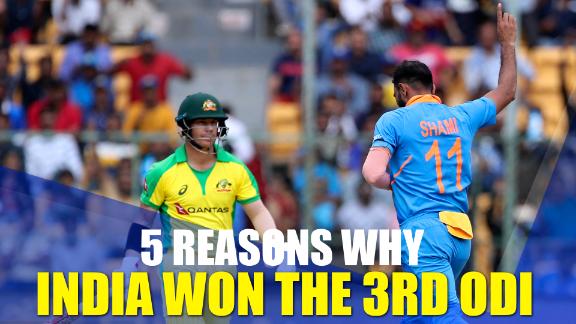India 289 for 3 (Sharma 119, Kohli 89) beat Australia 286 for 9 (Smith 131, Labuschagne 54, Shami 4-63, Jadeja 2-44, Bumrah 0-38) by 7 wickets
Without their allrounder going into the series, losing their in-form opening batsman to injury during the series decider, India found a way to win the three-match ODI series against Australia despite losing all three tosses. Australia's decision to bat first left Virat Kohli smiling ear to ear, his bowlers only widened that smile by keeping Australia down to 286 despite a Steven Smith century, but the chase was not your regular stroll that the scoreline suggested. On a testing, slow pitch, Rohit Sharma scored a special century to negate the challenge.
In the final equation, on a pitch that spinners from both sides were a threat, the two main quicks from either side proved to be the difference. Jasprit Bumrah was stellar in conceding just 38 in his 10 overs, and Mohammed Shami took wickets with the new ball and old. Pat Cummins and Mitchell Starc, though, were a big letdown for Australia, conceding 130 runs in 16 wicktless overs between them, which meant when the spinners and Josh Hazlewood bowled well, Sharma and Kohli were not under any asking-rate pressure.
Australia's team management had stayed at the ground till late on match eve to know dew wouldn't play a big role. Combined with a dry pitch, and their own suspect middle order, they wanted runs on board. Shami dealt those hopes a big blow in the first exchanges despite a wayward - eight wides in first three overs - by both of India's opening bowlers.
In the fourth over, Shami got the ball to shape up to swing back into David Warner, but leave him upon pitching, taking the edge. This was a dismissal from an opening hour of a Test match. Bumrah's edge over Aaron Finch was apparent again with two runs off 13 legal deliveries. Even when India removed Bumrah after just three overs, the edginess remained, especially with Navdeep Saini bowling the eighth over for just two runs.
In the ninth over, Finch went for perhaps a highly risky single to Jadeja at point, but Smith was the bigger culprit in not trusting the call from the non-striker. The run-out left Finch furious, and Smith with a big task of shepherding the suspect middle order. Except that he was met in the middle by his clone Marnus Labuschagne, who has quickly shown he doesn't need much shepherding. Yet, had Kuldeep Yadav collected a slowish throw cleanly he might have run Labuschagne out to make it 57 for 3.
That error survived, Smith and Labuschagne pulled Australia out of that crisis, taking them into the last 20 overs with eight wickets in hand. This time Labuschagne reached his maiden half-century too. However, just like the last match, Ravindra Jadeja had begun to frustrate the batsmen with tight overs. In partnership with Yadav and Shami, he strung together 45 deliveries without a boundary. Then he had Kohli helping him in the 32nd over.
At a close extra cover, Kohli made an excellent diving save to his left to deny Labuschagne a boundary first ball. To the third ball, he dived to his right to dismiss Labuschagne after a maiden fifty. An experiment to pinch-hit with Mitchell Starc lasted three balls with a slog sweep ending up with deep midwicket. Before this double-wicket maiden, at 173 for 2 in 31 overs, Australia were looking good for a score in the vicinity of 320 despite that recent slowdown.
If Starc's dismissal was a sign the pitch was not the usual flat Bangalore surface, Smith's failure to place the ball in the coming overs only reinforced it. A mix of orthodox and reverse sweeps from Alex Carey gave Australia some momentum in a run-a-ball 58-run partnership, but the moment Carey tried to hit a six even he ended up miscuing Yadav to deep cover. Add to it the reverse swing India extracted, and Smith had to recalculate and target only the very last overs.
Smith threatened a final kick with 25 off eight deliveries, but Shami not only had him caught at deep midwicket, he also ensured there was no annoying cameo from the tail.
It was obvious fairly early this was not going to be an easy chase. Not often in ODI cricket do you see two fairly close lbw appeals, three plays and misses and one edge falling short against Sharma in the first 10 overs. Also just as rare is Sharma taking extra risks and scoring 41 runs in those 10 overs.
This was a delicate situation. Shikhar Dhawan had injured himself while fielding. KL Rahul was opening with him after having kept for 50 overs. The ball was doing a bit off the seam. India's batting more or less went till No. 6 Jadeja. Rohit, though, backed himself and knew he couldn't let India fall behind the game by the time spin came on.
So when Ashton Agar, Adam Zampa and Hazlewood put the squeeze on, taking Rahul's wicket and conceding 35 in the next 10 overs, India could sit back and absorb that pressure. And when pressure was built, Finch didn't go to his main bowlers to go find the breakthrough. He gambled. First with Labuschagne, then with himself. Twenty runs in two overs. Pressure off. And when Finch finally brought his main bowlers, they released the pressure further. Before Rajkot, Starc had taken a wicket at least in his previous matches; now he had two wicketless outings.
Not that Sharma really needed freebies. He knew Kohli was going to set up to play till the end. He kept taking calculating risks, hitting six sixes in his innings, reaching his hundred with India's score only 154. When he did perish, he did so trying to put the chase beyond doubt, looking to hit his seventh six. It left India 81 to get in 80 balls, and if there were any nerves with a shortened batting line-up, the king of chases was there to soothe them.
In Kohli's company, Shreyas Iyer too made a mini comeback from a mini slump. Kohli missed out on a century, but by the time he fell for 89 India needed just 13 from 25.




